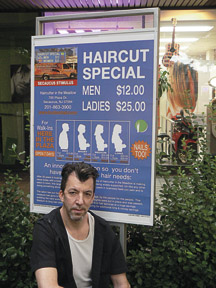Is the recession, which began almost two years ago in December 2007, finally coming to an end? Economic analysts have their opinions. Politicians in Washington have theirs.
And hair stylists have theirs.
While economists are busy interpreting statistics and other complicated, conflicting data, stylists have their fingers on the pulse of their customers as they grind their way through layoffs, job searches, mounting debt, and cash shortages.
Long the confidants of people who’ve felt comfortable sharing personal secrets while getting their hair done, stylists and barbers have a unique perspective on how regular people live.
“I’ve been in this business 40 years, and I’ve never seen anything like this. My customers would tell you the same thing,” said Rob Coffman, owner of Hudson Hair in Secaucus. “What I hear from a lot of people is fear, fear about their own futures and what that future will look like.”
“If I had to judge, based on what my customers tell me, I don’t think the recession is really over,” said Anthony Reza, a barber in Union City. “And if it is, it’s not really something they’re feeling or experiencing.”
Two of Sosa’s customers recently announced that they had found new jobs in the city.
________
“The mood among my customers is, ‘Things are getting better,’ ” said Jennifer Sosa, a stylist in Jersey City’s Silk Salon. “I’m hearing stories of new jobs and promotions again. These are stories I probably haven’t heard since I can’t remember.”
The gloomy forecast
“I think everybody has gone into survival mode,” said Coffman, who said he remembers the recession of the late 1980s and doesn’t recall that economic downturn being as bad as the current one. “This recession is affecting people who never thought they’d be in the situation they’re in right now. I’m talking educated, salaried people who’ve been laid off and haven’t found a full-time job and have been out of work for two years. I’m talking people who have gone through savings, investments, whatever they had, and they don’t know how they’re going to make it through the end of the year.”
Coffman believes news reports that the economy is improving are misleading and don’t accurately reflect the economic choices that regular citizens are forced to make every day.
Reza agrees. “I have one customer, he works a 40 hour a week job,” he said. “His girlfriend [whom he lived with] lost her job last year, so he got a second one on the weekends. The girlfriend is still looking for something. In the meantime, they couldn’t pay the rent on their place without her income. So now he’s living with his sister. The girlfriend and their two kids are living with her mother.”
The break up of the family affected where the children registered for school this fall. The family had been living in Union City where the children attended a school the parents liked. Now the children are living in Bayonne and are attending a school that’s unfamiliar.
“This is just one family,” Reza said. “I could probably tell you a dozen stories of other customers who have similar situations going on.”
Affects business
The downturn has affected business at the salons, too.
Coffman, for example, said his salon only offers basic nail services now and no longer advertises more expensive nail services that most customers can’t afford.
An indication of the effect of the recession can be seen in the amount of products salons have to order from their suppliers. Two years ago, his monthly supply orders were between $4,000 and $6,000. Now monthly orders are between $400 and $600.
And last year, Coffman cut his prices for haircuts in half.
“Like my customers, I’m having to make choices so that I can stay in business,” he said.
The improving forecast
But some have seen signs of improvement.
“Several of my customers who were out of work have either found jobs again, or are at least getting interviews,” said Sosa. “And they’re getting interviews they want. It’s not like they’re applying for waiting jobs that you do just to earn some money.”
Two of Sosa’s customers who had been out of work for more than a year recently came in for hair cuts and announced that they had found new jobs in the city.
“It’s nice for me,” she said. “Now that they’re working again, hopefully they’ll be coming in here more for services.”
When they were out of work, each of these customers had lengthened the time between appointments to save money.
CiCi Tenor, the manager of Hair Today in Jersey City, has seen similar changes among her clients.
“My customers are spending more,” she said. “Now, mind you, they aren’t spending a lot. But I notice that things they had cut back on, they’re starting to do again.”
Last year, Tenor said she rarely saw her customers come in with shopping bags from the local strip mall or the nearby Pavonia Newport Center Mall.
“Now I’ll see maybe they’ll have a bag from the Gap or Victoria’s Secret or something,” she noted. “Either they have more discretionary income, or they’re feeling better about spending that money on something that isn’t an absolute necessity. Last year I think that money was going to pay basic needs.”
E-mail E. Assata Wright at awright@hudsonreporter.com.
